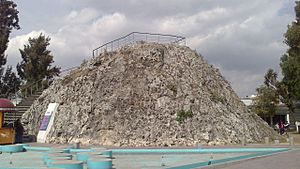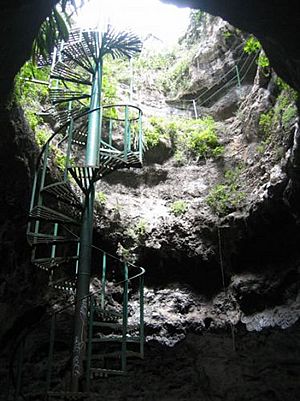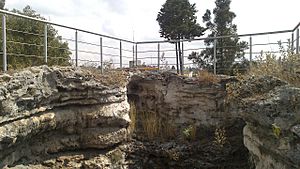Cuexcomate facts for kids
Cuexcomate is an inactive geyser found in the city of Puebla, Mexico. It's known for its unique shape, which looks like a giant earthen jar. This is why it's named "Cuexcomate," which comes from the Nahuatl word for a large jar used to store grain.
Many people mistakenly call Cuexcomate 'the smallest volcano in the world' because of its shape. However, it is important to know that it is not a volcano at all! It's actually a special rock formation created by water.
The cone-shaped structure built by the geyser is about 13 meters (43 feet) tall. Its base is around 23 meters (75 feet) wide. Inside, there's a central opening, or crater, that is about 8 meters (26 feet) wide and 17 meters (56 feet) deep. Today, there's a metal spiral staircase that lets visitors go down into the inside of Cuexcomate. Sometimes, special cultural events are held there.
Contents
What Makes Cuexcomate Special?
Cuexcomate is a very unique natural formation. Here are some of its key features:
- Type of Geyser: It's a calcitic chemical deposit. This means it's made mostly of a rock called calcite, which is different from most geysers that are made of silica.
- Height: The structure stands about 13 meters (43 feet) tall.
- Crater Size: The opening at the top is about 8 meters (26 feet) wide.
- Base Size: At its widest point, the base is about 23 meters (75 feet) across.
- Weight: It weighs around 400 tons.
- How it Formed: It was created by hot geothermal waters that came up from underground. Sometimes, these waters would burst out with high pressure.
A Look Inside Cuexcomate
The crater of Cuexcomate is an empty cone. It was formed by an extinct geyser, meaning the hot water no longer bursts out. This empty space is what visitors can explore today.
Cuexcomate's History
Cuexcomate was formed a long time ago, before the year 1064. This was even before the famous Popocatépetl volcano erupted that year. The hot water that created Cuexcomate likely came from deep underground, flowing through ancient limestone rocks.
The area where Cuexcomate is located was once a separate town called La Libertad. In 1943, La Libertad became part of the city of Puebla. On November 27, 1970, a special plaque was placed near Cuexcomate to remember the founding of La Libertad.
Visiting Cuexcomate
Cuexcomate is a popular place to visit in Puebla. You can find it at the corner of 2 Poniente (west) and 3 Norte (north) streets, in the Colonia La Libertad neighborhood.
The best part about visiting is being able to go inside! There are spiral metal stairs that allow you to walk down into the center of the crater. It's a cool experience to see the inside of this unique natural wonder.
See also
 In Spanish: Cuexcomate (Puebla) para niños
In Spanish: Cuexcomate (Puebla) para niños




